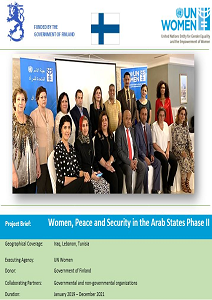Women, peace and security
Since 2013, the Iraqi political scene has been affected by many developments at the national and regional levels. In response to the appalling humanitarian crisis, which has made millions flee their homes, mostly women and children, UN-Women has been joining forces with sister agencies to assist refugees and internally displaced women providing protection, GBV and legal services, cash for work and livelihoods support and setting up income generation projects in the north and central of Iraq. To complement the humanitarian efforts provided, UN-Women has been advocating for the participation of women and the inclusion of gender perspectives in peace negotiations and reconciliation building; ensuring that such perspectives are supported and sustained by the entire country. As a result, Iraq has been the first country in the Arab region to develop a National Action Plan (NAP) on the implementation of the UNSCR 1325 on Women, Peace and Security and is currently embarking upon developing its second NAP in close coordination with all stakeholders. These efforts have been fully coordinated with the Government of Iraq, the Regional Government of Kurdistan, UN agencies, and CSOs operating at the grassroots level.
Response to GBV women and girl survivors in Iraq
UN Women played a key role in supporting the office of the Iraqi president in drafting an Anti-Domestic Violence law (ADVL). In 2020, UN Women worked closely with the members of the parliament on making amendments to the Anti-Domestic Violence Law, which was presented to the Federal Government Parliament at the end of 2019. By conducting trainings and discussions on the proposed law, UN Women advocated and lobbied for the passing of the law at the Parliament. In parallel, a public campaign was implemented to advocate for the passing of the Anti-Domestic Law through publishing anti-violence messages, raising public awareness on GBV and on the importance of the adoption of the new law. Work was carried out specifically with justice sector professionals to increase the prosecution of GBV cases and improve judicial responses. Moreover, capacity development training was also provided to the police and security forces on GBV and CRSV.
Partnerships with the high judiciary council and recent interventions and work with justice sector professionals has led to the establishment of Anti-domestic violence courts in Iraq. As a result, prosecution of GBV cases are increased and judicial responses are improved specifically regarding cases involving GBV and CRSV. In addition, based on the decision of the Supreme Judicial Council in Baghdad, criminal and misdemeanor courts will be formed as of 7/1/2021 and will be specialized in investigating cases of domestic violence alongside its ordinary cases within each appellate area.
Through its projects, UN Women also supports women by providing psychological and legal services and livelihood opportunities to gender-based violence survivors (GBV) and women displaced in Iraq through building partnerships with governmental and non-governmental organizations. UN Women also works with first responders and survivors of conflict-related sexual and gender-based crimes, domestic police and security, judges and prosecutors.
Project Brief
